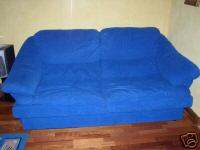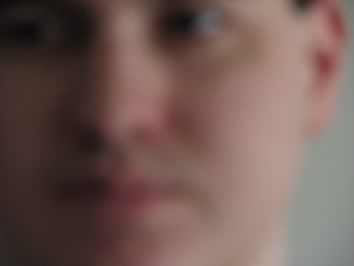I've been a long time admirer of Renato Cuocolo and Roberta Bosetti's ongoing investigations into the performance experience. However, whilst I enjoyed The Diary Room and particularly Private Eye, I often feel I am never quite getting the full affect the pair may have intended. As I wrote my honours thesis on the role of the audience, I am particularly drawn to presentation, and innovative approaches to 'conversing' with the spectator. The problem is that often the 'hook' of the conventions used in IRAA's work (eg the one-on-one [or so it seemed..] experience offered in Private Eye) overshadows or possibly even distorts the content of the work. Their work is typically driven by memories, secrets - often presented in wordy, revealing 'confessions' and usually performed primarily by Bosetti. It's not always easy work. The writing is dense, poetic and full of imagery - and it is not always easy to understand Bosetti's thick Italian accent (though, admittedly, focusing intently and decoding the language is half the fun).
So it was with great curiosity that I showed up at their residence last week for 'season one' of their latest work - The Nature of Things: Relics & Time. We entered, and were left to wait in a sparse room, where a TV in the fireplace ran a video 'tour' of the house in Vercelli (i think it was). Then we were finally called and taken through the house, shown actual objects and objects similar to those in Roberta's childhood home. All the while she began relating to us her memories of the house, the kitchen, certain objects - in particular a certain table cloth. This object is the catalyst for her memories of a particular time in her life that become clearer and clearer to both her and us as the evening wears on.
On a purely academic level, it was thrilling. I loved the concept of trying to revive and transplant the ghosts of your childhood home into a foreign setting decades later to a room full of strangers. We witness Roberta, through a process of repetition and noting down details, having a 'revelation' about the past, that causes her to reassess her memories, and the memories she associates with certain objects. Near the beginning of the piece, she chats with us briefly, asking us to share memories about our early homes. In turn, with her revelation, we must question our own shared memories - are they fact, fiction, or somewhere in between?
I attended with five friends. Four of them absolutely hated this piece while the other (Vlad the Cowboy Mouth) liked it quite a lot. I admit to falling somewhere in the middle. As I said, I very much liked the ideas involved - and as I write about them here they sound even better than I remembered!, but the piece really failed to make any connection with me (and I it) in real time, in a meaningful way. Again (and I hate to say this because it seems such a petty criticism), Roberta's accent made the effort required to follow the language quite considerable. It also made her 'conversational' style and casual interaction with us seem stilted - in a way I could see the 'script' and it felt a bit like seeing the strings on a puppet. I felt that the objects or 'relics' in the house did not go far enough in realising the theme of dislocation - perhaps more objects, more details would have been useful. While IRAA's work has never intrinsically included audience 'participation' as such, they have attempted to bridge the gap created by many theatre formalities - both in their performance location and in their presentation and style. A real intimacy with the audience is often offered and achieved. I feel The Nature of Things failed in this aspect. Yes, we were invited into their home, but it felt quite clearly choreographed and scripted (as it was, of course) and the 'story' itself failed to fully engage the visitors (especially the ones I saw it with).
In the end, it was another satisfying experience - seeing fine performance makers at work, with a challenging idea and another innovative presentation. Whilst this time it felt a little hollow, it certainly won't stop me catching their next work.
Tuesday, February 20, 2007
Sunday, February 18, 2007
For Your Records...
|
Well, boredom and the internet have yielded another indispensible love child of information. This is what I am, apparently. For the record, I love plants, nature, the outdoors - all of that green stuff. Preferrably when it's on TV. Nurturing my own plants? Taking valuable minutes out of my flashy but brief existence on this planet to do so? Please. I'm an artist - not a robot! I vote NO to personal plants. I do, however, like cats, puppies and fish. With garden salad, of course.
Saturday, February 10, 2007
Thoughts on 'Chocolate Monkey'
Just a quick recording of some of the thoughts I had on The Amazing Business' Chocolate Monkey which I managed to catch on Wednesday 7th. It was so easy to enjoy this piece. It was frenetic, funny, honest, and many artists will identify with many of the struggles John-Paul Hussey plays out. In many ways, it appears to be a piece about a piece - one that's failure was the ovum from which this work appeared.
Hussey is the sole story teller here, and does so through a number of characterisations and accents. He excels with te accents - not so much for their technical perfection, but for the spirit and tone of the characters he portrays. I often felt he was least comfortable as himself - stumbling over a few lines over the evening. Hussey's energy and physicality sort of belies his stocky, pot-bellied form (with his bald head he resembled Little Britain's Matt Lucas). When he initially introduces himself to the audience as 'the cheeky monkey', it is not a stretch to imagine him as such - and I think this part of his charm, and why everyone responds to his heartfelt tales of the ups and downs of the independent theatre scene so strongly.
Of course, the piece is about much more than theatre. It is about beginnings and endings, inspiration and isolation. While the piece was easy to enjoy, I couldn't help feeling there were some themes and ideas that deserved more investigation. The conclusion and some of the metaphors involving the 'ovum', a Kinder Surprise and the toy within were a little too neat and at times rather obvious. Also, there were a couple of ideas that appeared early on, hinting at something more before being mysteriously forgotten about - leaving their inclusion seeming rather incongruous. For example, near the start Hussey tells in three easy steps how to speak Japanese - in effect it turns out to be how to 'appear' to be speaking Japanese (pretend to be constipated etc). It was almost offensive, but seemed to hint at the idea of stripping things down to their most basic (perceived) elements. I was certainly interested in where in might go, but it wasn't referred to again and I have no idea what its purpose was. In the end, however, it doesn't really matter. It is Hussey's own story that is pivotal. His struggle with weight, the failure of his theatre piece, the endless questioning of his day-to-day existence - it is a very personal story, and as such it is certainly effective.
Anyway, that's about it. It was nicely staged at the Black Box (a venue a really like, despite the immovable columns). The music was almost a character in itself at times, and the lighting and wall and floor projections worked really well also. In short, I had a lot of fun.
Hussey is the sole story teller here, and does so through a number of characterisations and accents. He excels with te accents - not so much for their technical perfection, but for the spirit and tone of the characters he portrays. I often felt he was least comfortable as himself - stumbling over a few lines over the evening. Hussey's energy and physicality sort of belies his stocky, pot-bellied form (with his bald head he resembled Little Britain's Matt Lucas). When he initially introduces himself to the audience as 'the cheeky monkey', it is not a stretch to imagine him as such - and I think this part of his charm, and why everyone responds to his heartfelt tales of the ups and downs of the independent theatre scene so strongly.
Of course, the piece is about much more than theatre. It is about beginnings and endings, inspiration and isolation. While the piece was easy to enjoy, I couldn't help feeling there were some themes and ideas that deserved more investigation. The conclusion and some of the metaphors involving the 'ovum', a Kinder Surprise and the toy within were a little too neat and at times rather obvious. Also, there were a couple of ideas that appeared early on, hinting at something more before being mysteriously forgotten about - leaving their inclusion seeming rather incongruous. For example, near the start Hussey tells in three easy steps how to speak Japanese - in effect it turns out to be how to 'appear' to be speaking Japanese (pretend to be constipated etc). It was almost offensive, but seemed to hint at the idea of stripping things down to their most basic (perceived) elements. I was certainly interested in where in might go, but it wasn't referred to again and I have no idea what its purpose was. In the end, however, it doesn't really matter. It is Hussey's own story that is pivotal. His struggle with weight, the failure of his theatre piece, the endless questioning of his day-to-day existence - it is a very personal story, and as such it is certainly effective.
Anyway, that's about it. It was nicely staged at the Black Box (a venue a really like, despite the immovable columns). The music was almost a character in itself at times, and the lighting and wall and floor projections worked really well also. In short, I had a lot of fun.
Subscribe to:
Comments (Atom)



